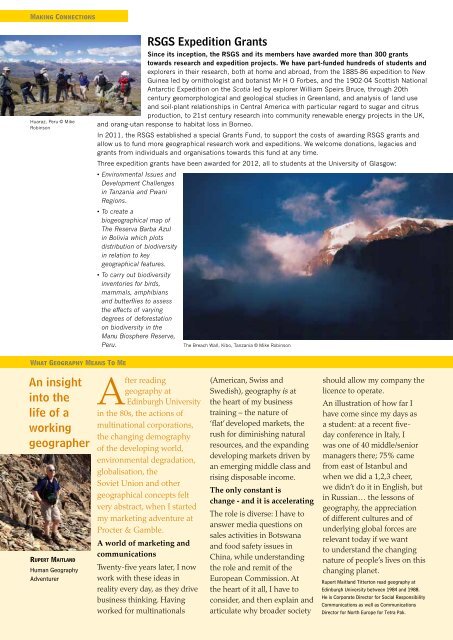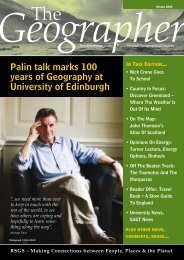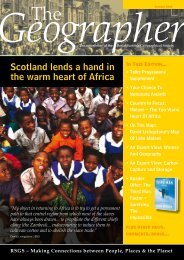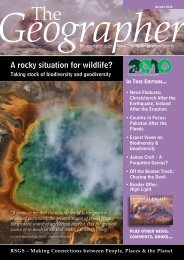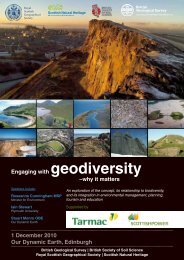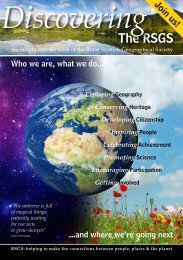Summer - Royal Scottish Geographical Society
Summer - Royal Scottish Geographical Society
Summer - Royal Scottish Geographical Society
Create successful ePaper yourself
Turn your PDF publications into a flip-book with our unique Google optimized e-Paper software.
Making Connections<br />
Huaraz, Peru © Mike<br />
Robinson<br />
RSGS Expedition Grants<br />
Since its inception, the RSGS and its members have awarded more than 300 grants<br />
towards research and expedition projects. We have part-funded hundreds of students and<br />
explorers in their research, both at home and abroad, from the 1885-86 expedition to New<br />
Guinea led by ornithologist and botanist Mr H O Forbes, and the 1902-04 <strong>Scottish</strong> National<br />
Antarctic Expedition on the Scotia led by explorer William Speirs Bruce, through 20th<br />
century geomorphological and geological studies in Greenland, and analysis of land use<br />
and soil-plant relationships in Central America with particular regard to sugar and citrus<br />
production, to 21st century research into community renewable energy projects in the UK,<br />
and orang-utan response to habitat loss in Borneo.<br />
In 2011, the RSGS established a special Grants Fund, to support the costs of awarding RSGS grants and<br />
allow us to fund more geographical research work and expeditions. We welcome donations, legacies and<br />
grants from individuals and organisations towards this fund at any time.<br />
Three expedition grants have been awarded for 2012, all to students at the University of Glasgow:<br />
• Environmental Issues and<br />
Development Challenges<br />
in Tanzania and Pwani<br />
Regions.<br />
• To create a<br />
biogeographical map of<br />
The Reserva Barba Azul<br />
in Bolivia which plots<br />
distribution of biodiversity<br />
in relation to key<br />
geographical features.<br />
• To carry out biodiversity<br />
inventories for birds,<br />
mammals, amphibians<br />
and butterflies to assess<br />
the effects of varying<br />
degrees of deforestation<br />
on biodiversity in the<br />
Manu Biosphere Reserve,<br />
Peru.<br />
The Breach Wall, Kibo, Tanzania © Mike Robinson<br />
What Geography Means To Me<br />
An insight<br />
into the<br />
life of a<br />
working<br />
geographer<br />
Rupert Maitland<br />
Human Geography<br />
Adventurer<br />
After reading<br />
geography at<br />
Edinburgh University<br />
in the 80s, the actions of<br />
multinational corporations,<br />
the changing demography<br />
of the developing world,<br />
environmental degradation,<br />
globalisation, the<br />
Soviet Union and other<br />
geographical concepts felt<br />
very abstract, when I started<br />
my marketing adventure at<br />
Procter & Gamble.<br />
A world of marketing and<br />
communications<br />
Twenty-five years later, I now<br />
work with these ideas in<br />
reality every day, as they drive<br />
business thinking. Having<br />
worked for multinationals<br />
(American, Swiss and<br />
Swedish), geography is at<br />
the heart of my business<br />
training – the nature of<br />
‘flat’ developed markets, the<br />
rush for diminishing natural<br />
resources, and the expanding<br />
developing markets driven by<br />
an emerging middle class and<br />
rising disposable income.<br />
The only constant is<br />
change - and it is accelerating<br />
The role is diverse: I have to<br />
answer media questions on<br />
sales activities in Botswana<br />
and food safety issues in<br />
China, while understanding<br />
the role and remit of the<br />
European Commission. At<br />
the heart of it all, I have to<br />
consider, and then explain and<br />
articulate why broader society<br />
should allow my company the<br />
licence to operate.<br />
An illustration of how far I<br />
have come since my days as<br />
a student: at a recent fiveday<br />
conference in Italy, I<br />
was one of 40 middle/senior<br />
managers there; 75% came<br />
from east of Istanbul and<br />
when we did a 1,2,3 cheer,<br />
we didn’t do it in English, but<br />
in Russian… the lessons of<br />
geography, the appreciation<br />
of different cultures and of<br />
underlying global forces are<br />
relevant today if we want<br />
to understand the changing<br />
nature of people’s lives on this<br />
changing planet.<br />
Rupert Maitland Titterton read geography at<br />
Edinburgh University between 1984 and 1988.<br />
He is Corporate Director for Social Responsibility<br />
Communications as well as Communications<br />
Director for North Europe for Tetra Pak.


